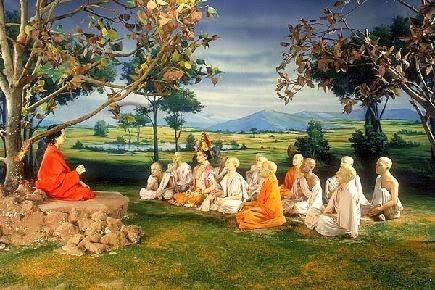Schools Of Philosophy
Jun 17, 2019 • 34 views
What do we know about philosophy?
Philosophy is the study of general fundamental questions about existence, knowledge, values, reason, mind and language. Such questions are often posed as problems to be studied or resolved. This is the definition given by Pythagoras.
In ancient India, there were six schools of Indian philosophy:
Samkhya
Yoga
Nyaya
Vaisheshika
Mimansa
Vedanta
1. Samkhya
It is also called sankhya i.e numbers. So samkhya deals about the number of elements that constitutes he reality of universe which impart the perfect knowledge. Therefore samkhya also known as study of perfect knowledge. This school is established by sage Kapila. According to philosophy, there are two ultimate realities in the universe.
a.Purusha b. Prakriti
Purusha is the self consciousness that doesn't cheat. While prakriti has three Gunas - Sattva, Tamas and Rajas. Sattva is pure state of harmony. Tamas is state of darkness.Rajas is attraction, energy or state of energy.
Sometimes two Gunas combine and overpower the third one which disturbs the system and evolution occurs.
For the better understanding of purusha and prakriti there is theory of causation- which deals with the question whether cause pre-exits before effect.
Sathkaryavad - real effect
Asathkaryavad - effect is produced by cause.
The samkhya school gives the Doctrine of Evolution.
2. Yoga
It is the second school of philosophy and was established by Patanjali. It believes that yoga is the practical part of samkhya philosophy. This emphasize on separating of purusha from prakriti through mental and self discipline. Yoga talks about detachment.
There are few rules:
Self control - Yama
Rules - Niyama
Fixed postures - Asana
Breath control - Pranayam
Choosing an object - Pratyahara
Fixing the mind - Dharna
Concentating - Dhyana
Complete detachment - samadhi
3. Nyaya philosophy
According to Nyaya philosophy the main question is why human being suffer? The answer to this question is that, human being suffer because of the ignorance of right knowledge. There are only 4 true sources of knowledge which impart the right knowledge. The word Nyaya means rule or method. So the Nyaya philosophy tells about the method of gaining right knowledge. This school was built by Gautama. Four valid means of knowledge are
Perception
Inference
Comparison
Sound and testimony
Invalid knowledge involves memory, doubt, error and hypothetical argument.
4. Vaisheshika philosophy
This was established by kanada and it is famous for it's atomic theory. It also believes in pluralist realism because it talks about different elements of which universe is made of. Vaisheshika philosophy believes in only two valid knowledge perception and inference. This school believes that every cause effect is the new beginning.
5. Mimansa
Reflection or critical investigation. It gives rules for the interpretation of Vedas. I.e it believes in the authority of Vedas. Mimansa gives importance to the verbal testimony which is essentially the vedic testimony. Mimansa supports the law of karma.

6. Vedanta
It means the "conclusion" (anta) of Vedas. It is based on three texts.
Upanishads - Brihadaranyaka, the chanyogya, the taittiriya and the Katha.
The Brahma sutras
Bhagavadagiita (the song of lord)
Kevala Advaita - The founder is Sankaracharya. Kevala Advaita is usually referred to simply as Advaita.
